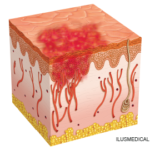Some patients with substance use disorders may find it difficult to stop taking the drug that triggered their rheumatologic disorder, Dr. Graf acknowledged. And some patients using drugs like cocaine may not fit the stereotypical profile of a drug user. “Even with someone you wouldn’t expect to be using these drugs, it’s a mistake to assume that it’s not a concern. In fact, cocaine use is prevalent in all aspects of society.” An estimated 1.9 million Americans actively used the illegal drug in 2008.
‘It’s important for rheumatologists to have a generalized understanding of the drugs their patients may take, legal or not, that [have an] impact on autoimmune diseases.’ —Dr. Graf
Varieties of Drug Manifestations
There are many ways that cocaine can trigger inflammatory responses. These include blood vessel diseases, vasoconstriction and cocaine-associated midline destructive lesions that start with chronic sinusitis and mimic granulomatosis with polyangiitis, as well as a host of garden variety rheumatologic disorders and reports of more unusual types of cocaine-associated vasculitis. “Cocaine is associated with well-described autoimmune disorders,” Dr. Graf said. Treatment is based on recognizing the disease and encouraging cessation of cocaine use. There is also some case report-level evidence for using high-dose methylprednisolone.
Less well described are rheumatologic disorders directly linked with heroin, but these include membranoproliferative glomerulonephritis, other renal diseases and amyloidosis. Other vascular syndromes are associated with methamphetamines, MDMA (ecstasy), ADHD medications, such as Adderall and Ritalin, and other prescription medications. Even over-the-counter cold preparations, such as pseudoephedrine, can induce vasculopathy. Other examples include drug-induced lupus, hydralazine-induced vasculitis, pulmonary hypertension and necrotizing glomerulonephritis.
“We see a lot of things that don’t exactly fit the typical disease. You have to ask yourself: Is something else going on?” Dr. Graf said. “We often don’t know, but these patients may be losing tolerance to multiple antibodies and antigens,” he adds. For the front-line rheumatologist, urine toxicology screening can detect cocaine metabolites for up to 72 hours, but won’t detect levamisole, for which LC Tandem mass spectrometry is needed. Another tool for the doctor is to screen for anti-neutrophil cytoplasmic antibodies with fluorescence imaging.
Larry Beresford is an Oakland, Calif.-based freelance medical journalist.
Reference
- SAMHSA. Nationwide public health alert issued concerning life-threatening risk posed by cocaine laced with veterinary anti-parasite drug. Press Release. 2009 Sep 21. http://www.samhsa.gov/newsroom/press-announcements/200909210445.

